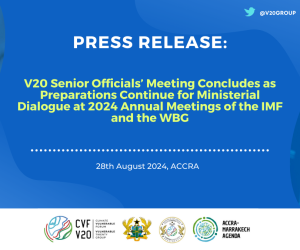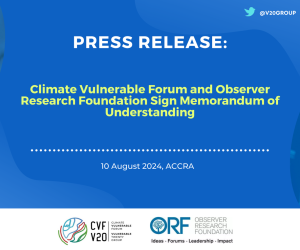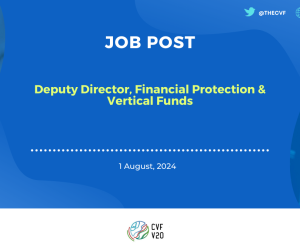V20 calls on IMF and developed countries to develop practical steps to deliver climate finance commitment
29 September 2021 – The V20 Group of Finance Ministers concluded its Senior Officials Meeting yesterday with a call on the International Monetary Fund and related international financial institutions to intervene with practical solutions for the delivery of the $100 billion per year pledged by developed countries under the Paris Climate Treaty.
Hosted by the Economic Relations Division (ERD), Ministry of Finance of Bangladesh, the Senior Officials Meeting focused on financing initiatives of the V20 and on advocacy and partnerships efforts for countries most threatened by climate change. As highlighted by the First V20 Climate Vulnerables’ Finance Summit and V20 Ministerial Dialogue VII, the world has arrived at ‘a point of no return’ and the most vulnerable suffer financial losses the most. The V20 calls for a joint ‘Delivery Plan’ from the developed nations to concretely demonstrate how annual climate finance will be met over the 5-year period from 2020 to 2024, or $500 billion in total.
IMF and other financial institutions are urged to jointly assess gaps and failures in international finance and to propose practical solutions, taking into consideration debt sustainability. Synergies between existing funds and streamlined direct access by countries must be prioritized. A clear and concrete Delivery Plan for the UNFCCC-agreed US$100 billion per year for the period 2020 until 2024, with a total of US$500 billion can include the following:
- Aggregate and individual public contributions from all developed nations per year, highlighting additionality to ODA (i.e., that climate finance is not just ‘re-purposed’ ODA)
- Public and private mobilizations to reach at least $500 billion in 50:50 balanced (adaptation-mitigation) flows for the period 2020-24
- Debt and grant proportions supported per developed country, showing a growing emphasis on grants especially for adaptation over time
- Growing emphasis of adaptation resources reaching developing nations particularly vulnerable to climate change
- Transparency on implementation through annual tracking conducted independently by the IMF
- IMF to ascertain the most efficient composition of climate finance
The new financing goal targets for 2025 can benefit from considering V20 Climate Finance Viewpoints which also underscores for an inclusive process, commensurate with ground truths. In line with risk-information, the V20 and Insurance Development Forum further confirm steps forward in a partnership to be launched at COP to provide vulnerable country governments with an open-access risk modelling platform and the knowledge to utilize the best of global and local models and data. Specifically the Global Risk Modelling Alliance is designed to enable V20 members to strengthen their physical climate risk management capabilities and create the trust and confidence necessary to attract investment in adaptation and risk financing solutions.
The V20 further look forward to reaching a way forward during the InsuResilience High Level Consultative Group meeting with G20+ members on smart premium subsidies and capitalization support and an improved climate and disaster risk financing and insurance architecture to highlight gaps in light of increasing frequency and intensity of climate-fueled disasters.
Efforts on key initiatives including the ‘climate prosperity’ program for the development and implementation of the strategic economic-climate-SDG investment and cooperation frameworks, commencing with Bangladesh’s ‘Mujib Climate Prosperity Plan’.
Since its founding in 2015, the V20 continues working through Multilateral Development Banks (MDBs) and national Financial Institutions (Fis) to develop an Accelerated Financing Mechanism: an innovative financing mechanism to bring down the cost of capital across the capital stack by directly unlocking at least $30 billion of private sector investments, through more systematic and optimized financial de-risking for resilient infrastructure and renewable energy.
A Sustainable Insurance Facility, provides climate-smart insurance for micro, small and medium-sized enterprises (MSMEs) and the vulnerable people that depend on them and aims to build local and regional insurance markets to help better absorb risk, develop resilient business models, and free up public and private resources for investment in the resilience and growth of the V20 economies and people. Asia-Pacific implementation is already advancing, supported by the Asian Development Bank’s ACliFF. The facility is now hosted in the UN Environment FI Principles for Sustainable Insurance Initiative, and supported by the Munich Climate Insurance Initiative
ABOUT
Formed in 2015, the V20 Group of Finance Ministers is a dedicated cooperation initiative of economies systematically vulnerable to climate change. It is currently chaired by the People’s Republic of Bangladesh. The V20 membership stands at 48 economies including Afghanistan, Bangladesh, Barbados, Bhutan, Burkina Faso, Cambodia, Colombia, Comoros, Costa Rica, Democratic Republic of the Congo, Dominican Republic, Ethiopia, Fiji, The Gambia, Ghana, Grenada, Guatemala, Haiti, Honduras, Kenya, Kiribati, Lebanon, Madagascar, Malawi, Maldives, Marshall Islands, Mongolia, Morocco, Nepal, Niger, Palau, Palestine, Papua New Guinea, Philippines, Rwanda, Saint Lucia, Samoa, Senegal, South Sudan, Sri Lanka, Sudan, Tanzania, Timor-Leste, Tunisia, Tuvalu, Vanuatu, Viet Nam and Yemen.
FOR INQUIRIES CONTACT:
Nabiha Shahab
[email protected]
+62 813 1421 3432
www.V-20.org





